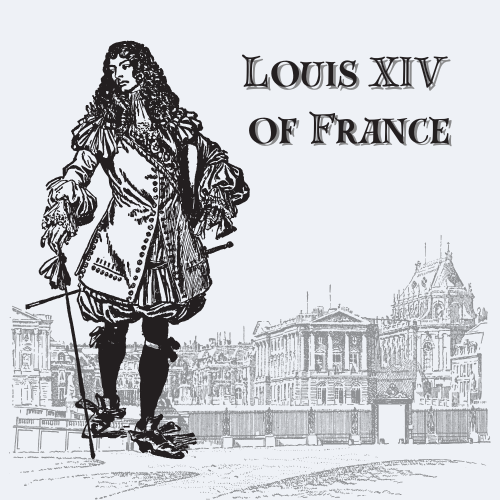
Louis XIV of France
Share
Louis XIV was born on 5 September 1638 and wore the crown of France for an astonishing 72 years—from 1643 until his death in 1715—the longest verified reign in European history. Later writers nick-named him the “Sun King” because he liked to compare his power to the steady light and heat of the sun itself, shining over everything in his kingdom.
When Louis was only four his father, Louis XIII, died. His mother, Anne of Austria, ruled as regent with Cardinal Mazarin while Louis grew up. Life was not peaceful: between 1648 and 1653 nobles and judges in Paris rebelled in a series of civil wars called the Fronde. At one point the little king even had to flee the city. Those frightening years taught him that disorder was dangerous and that a king must hold the reins of government tightly.
Mazarin died in 1661, and 22-year-old Louis stunned his ministers by announcing that he would now govern personally—no new chief minister needed. He believed in divine right: the idea that a king’s authority came straight from God. To symbolize that central role he chose the sun as his emblem and insisted that courtiers revolve around him just as planets circle the sun.
To keep every important person under his watchful eye, Louis transformed his father’s modest hunting lodge at Versailles into the most spectacular palace Europe had ever seen. Beginning in 1661 he ordered grand halls, gilded ceilings, the famous Hall of Mirrors, and gardens filled with fountains that shot water high into the air. In 1682 the entire royal court—thousands of nobles, servants, guards, and artists—was moved to Versailles. Each morning the king’s public “getting-up” ceremony, the lever, let chosen nobles hand him his robe or pass him his shoes, tiny honors that kept them competing for royal favor instead of plotting revolt.

Running such a glittering court and fighting wars cost mountains of money. Finance minister Jean-Baptiste Colbert tried to boost trade, encourage French industries, and collect taxes more efficiently, but the bills kept growing. New taxes like the capitation (1695) and the dixième (1710) reached into every pocket, and by Louis’s later years constant borrowing and bad harvests left France close to bankruptcy.
Louis also looked for glory on the battlefield. He fought the War of Devolution (1667-68) and the Franco-Dutch War (1672-78) to gain territory, then faced most of Europe in the Nine Years’ War (1688-97). His last and longest struggle, the War of the Spanish Succession (1701-14), aimed to put his grandson on the Spanish throne. Although France survived, the fighting drained treasure, cost lives, and left neighboring countries determined to stop any single king from becoming too powerful.
Religion was another field where Louis demanded unity. In 1685 he revoked the Edict of Nantes with a new law called the Edict of Fontainebleau, outlawing Protestant worship. Soldiers quartered in Protestant homes (a tactic nicknamed the dragonnades) pressured families to convert. More than 200,000 skilled Protestant Huguenots fled France, taking their talents to rival nations and hurting the French economy. Yet the Sun King’s court also blazed with culture. He danced in court ballets, founded the Royal Academy of Dance (1661), and made composer Jean-Baptiste Lully and playwright Molière household names. Painters and architects such as Charles Le Brun and André Le Nôtre helped spread a rich French Baroque style that other European rulers hurried to copy. By tying fame and funding to royal favor, Louis used the arts to broadcast the message that France—and its king—set the standard for elegance.
Louis XIV died at Versailles on September 1st, 1715, only four days before his 77th birthday. He left the throne to his great-grandson Louis XV because his own son and grandson had already died. France remained the largest and most populous kingdom in Europe, admired for its culture but staggering under war debts and heavy taxes. Later generations remembered Louis both as the brilliant master of Versailles and as a warning that absolute power, if unchecked, can strain a nation’s purse and its people.
